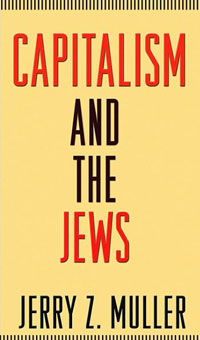Is It Good for the Jews?

The relationship of the Israelites to capitalism is, of course, the stuff of ethnic mythology and racial slander—Jews are both the sniveling Fagin-like shylocks controlling the world’s economy and the ardent, anti-capitalist, revolutionary zealots.
This is also the stuff of contradictions. Good thing Catholic University mentor Jerry Z. Mullerhas penned a slim tome, Capitalism and the Jews (Princeton U Press), which contains four essays explicating the prevailing view of the Hebrews and capitalism, Jews and communism, Yid responses to capitalism, and burgeoning ethnic nationalism and capitalism.
Harvard University’s Ruth R. Wisse opines:
Jerry Muller has written an indispensable book correcting myriad misperceptions about capitalism, the Jews, and the affinities between them. He treats troubling subjects such as the relation of the chosen people to communism and the persistence of anti-Semitism with exceptional delicacy and common sense. If clarification could bring about correction, this compressed historical account would do much to ‘repair the world.’
Muller refers to and unpacks economist Milton Friedman’s lecture at the University of Chicago in October, 1978 (the week he was awarded a Nobel Prize), entitled “Capitalism and the Jews,” where he began his remarks: “There are few peoples, if any in the world, who owe so great a debt to free enterprise and competitive capitalism as the Jews,” and “There are few peoples, if any in the world, who have done so much to undermine the intellectual foundations of capitalism as the Jews.”
I suggest a better title for Muller’s tome: Capitalism and the Jew: Money and Anti-Semitism. Professor Muller unpacks his approach:
And for that approach, he has offered a thoughtful and useful book.
